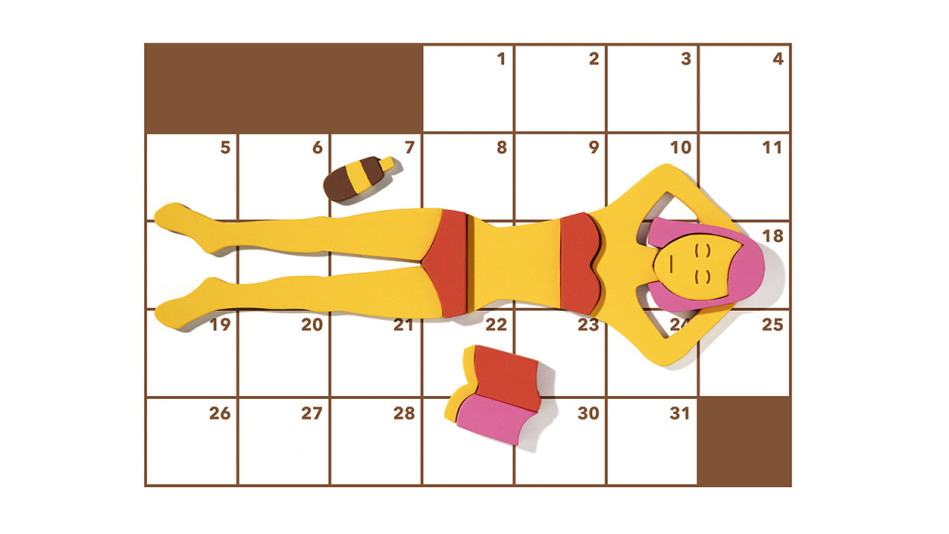5 Scientific Reasons You Should Go On Vacation
Discover the incredible physical and emotional perks of planning your next trip.

Illustration: Todd St. John
Americans ditched roughly half their earned vacation days in 2014, according to one survey. We get it: You're busy. But skipping vacations comes at a steep cost, experts say. If you're not taking every minute of leave you're due, it's time for a refresher on the health benefits of R&R.
Slimmer Waist
We don't have to tell you that taking a breather from your work life is relaxing. But did you know that women who spend more time engaged in pleasurable leisure activities, including regular vacations, don't just feel better, they also boast a healthier physique? In a University of Pittsburgh study of nearly 1,400 people, those who logged the most downtime had a lower body mass index and waist circumference—two key predictors of overall health.
Longer Life
Women who take the fewest vacations (once every six years or less) are nearly eight times likelier to have a heart attack or die of heart disease than those who enjoy two or more getaways annually, according to an analysis of the Framingham Heart Study, which followed women for two decades. Researchers considered an array of factors—from behavior and personality traits to education and social class—and discovered that the frequency of vacations was a strong predictor of future heart attacks and coronary death.
Less Stress
The rejuvenating effects of vacations may last longer than originally thought. A small study from the University of Vienna found that after taking time off from work, vacationers had fewer stress-related physical complaints such as headaches, backaches, and heart sensations (palpitations)—and were still feeling better five weeks later.
Steamier Love Life
Eighty percent of people who vacation every year report that romance is alive in their relationship, compared with 56 percent of those who don't take time off, according to a Nielsen survey. Why it matters: Sex may deliver many health benefits, from a lower risk of colds to better brain function.
Better Sleep
A study from Air New Zealand and former NASA scientists suggests you won't just sleep well on vacation—you'll also rest better after you get home. Researchers recruited a group of travelers en route to Auckland and gave them wrist devices to track both the quantity and quality of their sleep before, during, and after their trip, which ranged from seven to 12 days. The travelers not only averaged an extra hour of sleep per night during their break, but also clocked 20 minutes more rest nightly after returning home. "Vacations can help put a stop to sleep-disrupting habits, like doing work or staring at a backlit screen just before bed," says study coauthor Kevin Gregory, now a senior research associate at the San Jose State University Research Foundation at NASA Ames Research Center. "A little time away can be effective for hitting reset on so many levels."
Slimmer Waist
We don't have to tell you that taking a breather from your work life is relaxing. But did you know that women who spend more time engaged in pleasurable leisure activities, including regular vacations, don't just feel better, they also boast a healthier physique? In a University of Pittsburgh study of nearly 1,400 people, those who logged the most downtime had a lower body mass index and waist circumference—two key predictors of overall health.
Longer Life
Women who take the fewest vacations (once every six years or less) are nearly eight times likelier to have a heart attack or die of heart disease than those who enjoy two or more getaways annually, according to an analysis of the Framingham Heart Study, which followed women for two decades. Researchers considered an array of factors—from behavior and personality traits to education and social class—and discovered that the frequency of vacations was a strong predictor of future heart attacks and coronary death.
Less Stress
The rejuvenating effects of vacations may last longer than originally thought. A small study from the University of Vienna found that after taking time off from work, vacationers had fewer stress-related physical complaints such as headaches, backaches, and heart sensations (palpitations)—and were still feeling better five weeks later.
Steamier Love Life
Eighty percent of people who vacation every year report that romance is alive in their relationship, compared with 56 percent of those who don't take time off, according to a Nielsen survey. Why it matters: Sex may deliver many health benefits, from a lower risk of colds to better brain function.
Better Sleep
A study from Air New Zealand and former NASA scientists suggests you won't just sleep well on vacation—you'll also rest better after you get home. Researchers recruited a group of travelers en route to Auckland and gave them wrist devices to track both the quantity and quality of their sleep before, during, and after their trip, which ranged from seven to 12 days. The travelers not only averaged an extra hour of sleep per night during their break, but also clocked 20 minutes more rest nightly after returning home. "Vacations can help put a stop to sleep-disrupting habits, like doing work or staring at a backlit screen just before bed," says study coauthor Kevin Gregory, now a senior research associate at the San Jose State University Research Foundation at NASA Ames Research Center. "A little time away can be effective for hitting reset on so many levels."



